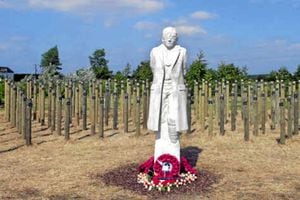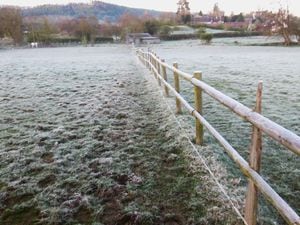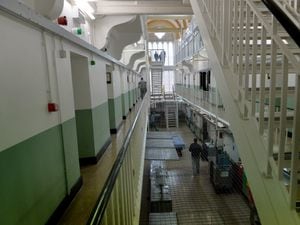Shropshire soldier in First World War mystery
As he lay dying, mortally wounded by shell splinters, Shropshire soldier James Lawton repeatedly called out to his colleagues for water.

As he lay dying, mortally wounded by shell splinters, Shropshire soldier James Lawton repeatedly called out to his colleagues for water.
But none would give him any.
Acting Company Sergeant Major Lawton died of his wounds the following day. He was 35.
In a final act of revenge - or spite - by his comrades, he was buried apart from the other 80 soldiers who fell in the battle.
His crime? Lawton was a dour martinet, who presented every fault in the worst possible light. Just two months before he died, he had given evidence against 20-year-old Private Isaac Reid.
On the basis of Lawton's testimony, Reid was found guilty of desertion and shot at dawn. His colleagues, who were ordered to form the firing squad, felt it was unjustified.
Lawton became a marked man, sent to Coventry, and forced to drink alone.
It is a remarkable story which appears to have been part of the folklore - or mythology - of the Scots Guards during World War One.
Is it true? In the 1919 book "A Private in the Guards", author Stephen Graham recounts it as an anecdote from earlier in the war, before he enlisted - Graham joined the Scots Guards in 1917.
He gives no names, but describes the incident as being during the Battle of Neuve Chapelle, when "Private X" was dazed by shellfire, and straggled in later, unable to give an account of himself. "Sergeant Major Y" reported him as a deserter, and the court martial accepted the sergeant major's testimony over that of the confused account of the private.
Although we may never discover whether the tale heard two years after the fact by Private Graham was accurate, new research led by Shrewsbury Great War historian Phil Morris has uncovered fascinating details and, crucially, has established that the hitherto mysterious "Sergeant Major Y" was blacksmith's son James Lawton, from Newport.
Enlisting into the Scots Guards in 1900, he served during the Boer War. Later based at home at the guards depot, he was keen on sports, and referee for regimental football matches.
Repeatedly promoted, he was Acting Company Sergeant Major with the 2nd Battalion of the Scots Guards when he was fatally wounded on May 16, 1915, at Festubert.
His wife and two young sons were living at Worthing in Sussex at the time of his death. He is commemorated on both Newport's war memorial and Worthing war memorial.
Phil Morris, who has been helped by Colin Taylor of the Western Front Association, and Steve Rogers of the War Graves Project, has uncovered details of the fateful court martial in which Lawton had played such a key part just a few weeks earlier.
Reid had gone missing from Lawton's party and did not return to the camp until later. He admitted to "losing his head" during the fighting.
In evidence, Lawton said: "About 2.30pm on March 11, 1915, the accused 8752 Pte I Reid was handed over to me by Cpl Shearing in the area of the reserve trenches near 20th Brigade HQ with the instruction he was to be taken to his Company.
"At the time I was returning from the reserve trenches to get more ammunition. I ordered the accused to fall in and remain with me and I saw him with my party about 6.30pm. About 7pm I was ready to go forward. I called out the accused's name and got no reply.
"I searched houses and ground close by but failed to find the accused. At 7.30pm I went forward with ammunition. I had not given the accused leave to fall out. About 11pm I returned to the place where I had last seen the accused. I called out his name again and got no reply."
Phil says: "Reid's character was described as very good, but adversely it was added that he was not a good fighter. Mercy was recommended, but none given.
"Isaac Reid was found guilty of desertion and sentenced to death by firing squad, and on the morning of April 9, 1915, he was taken out across the green at Laventie and shot by a tree.
"The Guards were paraded to watch the execution and Reid's company commander was in charge of the battalion firing squad."
There is a sequel, again told by Palmer in his book. He says that Reid's comrades in F Company vowed to salve themselves of the shame the next time they went into action.
During the Festubert battle, 80 of them were cut off. In accordance with their vow, they refused to surrender and died to a man, becoming dubbed "The Immortal Eighty".
l There's a comprehensive list of all Newport's war dead on the Shropshire Star website.
It is in memoriam of the townsmen who died in two World Wars, those who survived as members of the King's Shropshire Light Infantry 1914-18 and who have now passed.
Log onto www.shropshirestar.com/lifestyle/newport-war-memorial/





